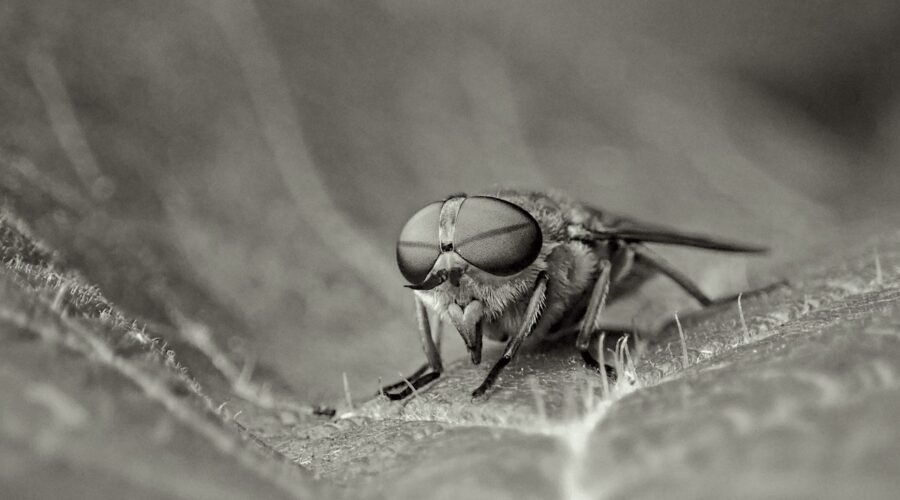The UK is in the grip of another record-breaking heatwave. With temperatures soaring, millions are heading outdoors to enjoy the sunshine. However, there is a downside to this glorious weather. Horsefly bites are on the rise, leaving many people in pain and searching for relief. The surge in cases has become one of the most searched health topics in the UK this summer. Horseflies thrive in warm weather. As more people wear shorts and T-shirts, exposed skin becomes an easy target. The combination of heat and increased outdoor activity has led to a spike in painful bites across the country.
What Is a Horsefly and Why Does It Bite?
Horseflies are large, dark flies with a reputation for delivering one of the most painful insect bites in Britain. Only female horseflies bite. They need blood to develop their eggs, and their mouthparts are designed to cut through skin rather than simply pierce it.
Unlike mosquitoes, horseflies do not inject an anaesthetic. This makes their bite immediately noticeable and extremely painful. The fly uses a scissor-like jaw to slice the skin, creating a wound that often bleeds and swells.
Signs You Have Been Bitten by a Horsefly
A horsefly bite is hard to miss. Here are the most common signs to look out for:
- A sharp, sudden pain at the bite site
- A raised, red, or discoloured bump
- Swelling that can spread beyond the bite area
- Itching and irritation that may last for days
- Sometimes a small cut or puncture in the centre of the bump
In some cases, the area may develop a large rash or welts. The skin can become very sensitive to touch. Horsefly bites often take longer to heal than other insect bites and can easily become infected if scratched.
Why Horsefly Bites Are Worse During Heatwaves
The current UK heatwave has created perfect conditions for horseflies. Warm, humid weather helps these insects breed and become more active. Reports from across the UK show a clear link between rising temperatures and a surge in horsefly bite cases.
People are spending more time outdoors, often near water or farmland where horseflies are common. Wet skin after swimming or sweating can attract these flies even more. The increased exposure has led to a wave of painful bites, with many seeking advice from pharmacists and the NHS.
How to Treat a Horsefly Bite at Home
Most horsefly bites can be treated at home with simple first aid. Follow these steps to reduce pain and prevent infection:
- Wash the bite area with soap and water as soon as possible
- Apply a cold compress or ice pack to reduce swelling
- Take over-the-counter painkillers like paracetamol or ibuprofen for pain
- Use antihistamine tablets or creams to ease itching
- Avoid scratching the bite to prevent infection
If the area becomes increasingly red, swollen, or starts to ooze pus, it may be infected. In this case, seek advice from your GP or call NHS 111. Severe reactions, such as difficulty breathing, dizziness, or swelling of the face or throat, require immediate medical attention.
When to Worry About a Horsefly Bite
While most bites are harmless, some can lead to complications. Watch out for these warning signs:
- Spreading redness or swelling beyond 10 centimetres
- Pus or yellow fluid at the bite site
- Fever, chills, or feeling unwell
- Swollen glands near the bite
- Signs of an allergic reaction, such as hives, wheezing, or difficulty breathing
In rare cases, a horsefly bite can trigger a severe allergic reaction called anaphylaxis. This is a medical emergency and needs urgent treatment.
Why Horsefly Bites Are So Painful
The pain from a horsefly bite is due to the way the fly cuts the skin. Its jaws act like tiny scissors, slicing through the flesh. The fly then injects an anticoagulant to stop the blood from clotting, making the wound bleed more and increasing the risk of infection.
Unlike other biting insects, horseflies do not numb the area first. This means you feel the pain instantly. The wound may continue to hurt for several days, especially if it becomes infected.
How to Avoid Getting a Horsefly Bite
Prevention is always better than cure. Here are some tips to protect yourself during the UK heatwave:
- Wear long sleeves and trousers when walking near water or farmland
- Choose light-coloured clothing, as horseflies are attracted to dark colours
- Avoid using strong perfumes or scented lotions, which can attract insects
- Keep windows and doors closed or use screens to keep flies out
- Use insect repellent on exposed skin, especially if you are in high-risk areas
If you are bitten, treat the area quickly and monitor for signs of infection. With the right care, most horsefly bites will heal without complications.
Horsefly Bite: The Takeaway for This UK Summer
The horsefly bite has become a trending topic for good reason. With the current UK heatwave, cases are on the rise, and many are searching for answers. Knowing how to spot the signs and treat a horsefly bite can help you stay safe and enjoy the summer with confidence.

